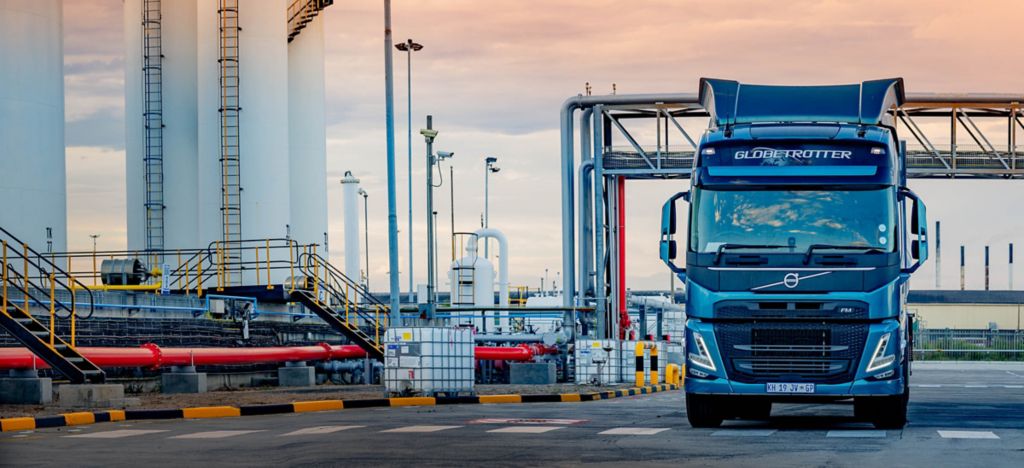Volvo launches powerful biogas truck for lowering CO2 on longer transports


Five years ago, Volvo Trucks launched its trucks that can run on liquified biogas, often called bio-LNG, which is a renewable fuel that can be produced from many types of organic waste, including food scraps. The fuel can reduce CO2 emissions by up to 100%.
“Biogas is a great complement to electric transports, helping hauliers with their sustainability ambitions and aims towards climate neutral transports,” says Waldemar Christensen, MD of Volvo Trucks South Africa. “That is especially true for Southern Africa, where fleets need to travel long distances to deliver cargo across the region for which bio-LNG trucks, with their larger 225kg fuel tanks and a range of up to 1 000km, would be ideal.”
The gas-powered trucks, the Volvo FH and FM are getting a new power level of 500 hp, joining the previous 420 and 460 hp engines. The gas engines also get major technical upgrades that make them up to 4% more fuel efficient**, which together with a new 10% larger gas tank, contributes to a longer range.
The efficient gas-powered trucks have a performance comparable to their diesel equivalents. Fueling up is almost as fast as a diesel truck.
Eric Parry, Sustainable Solutions Manager at Volvo Trucks South Africa, points out that there is no single solution that can solve climate change.
“The strengthened gas-powered lineup fits well with Volvo Trucks' three-path strategic roadmap to reach zero emissions: battery electric trucks, fuel cell trucks and combustion engines that run on renewable fuels like biogas, HVO or even green hydrogen,” explains Parry.
In South Africa, the first Volvo electric trucks will arrive in March 2023. However, LNG and Bio-LNG infrastructure, supply and dispensing are still a major challenge in the country.
“Several technical solutions are needed because the availability of energy and fuel infrastructure differs greatly between countries and regions, and also because the requirements for each transport assignment can vary,” comments Parry. “However, locally we are in a position to work with customers and suppliers to bring bio-LNG vehicles in as needed.”
Massive plans to replace fossil LNG with bio-LNG in Europe
Europe has a growing network of more than 600 fuel stations for both bio-LNG and LNG, which makes them ideal for long-haul transports.
European production of bio-LNG is expected to ramp up quickly to shift away from the use of fossil LNG. The EU Commission has put forward a plan called REPower EU, where the focus is on creating greatly increased domestic production capacity for different kinds of energy. The plan is to boost annual biogas production ten times by 2030* and the sector has already started a rapid growth phase. Also outside of Europe, the potential for biogas is gaining interest.
Facts about Volvo’s gas-powered trucks:
Facts about liquified gas:
* EBA (European Biogas Association) Statistical Report 2022.
** Real-world fuel performance and range may vary depending on many factors i.e. driving speed, use of cruise control, vehicle specification, vehicle load, actual topography, the driver´s driving experience, vehicle maintenance, and weather conditions.
LINK to the REPower EU document
LINK to high-resolution images.
Belinda Butler
Brand, Marketing & Communication, Volvo Trucks
Tel: +27 11 842 5000
Email: belinda.butler@volvo.com
Volvo Trucks supplies complete transport solutions for discerning professional customers with its full range of medium- and heavy-duty trucks. Customer support is provided via a global network of dealers with 2,300 service points in about 130 countries. Volvo trucks are assembled in 12 countries across the globe. In 2022 approximately 145,000 Volvo trucks were delivered worldwide. Volvo Trucks is part of the Volvo Group, one of the world’s leading manufacturers of trucks, buses, construction equipment and marine and industrial engines. The group also provides complete solutions for financing and service. Volvo Trucks’ work is based on the core values of quality, safety, and environmental care.